Communities in the northwest corner of B.C. opened Thursday’s provincial budget to discover briefcase full of cash.
The budget earmarked $250 million for the Northwest BC Resource Benefits Alliance (RBA) for the planning and construction of municipal infrastructure. The fund is set to be distributed over the next five years to support new industrial development and creating livable communities for the workforce.
The RBA Steering Committee, comprising Prince Rupert Mayor Herb Pond, Terrace Mayor Sean Bujtas, and Smithers Mayor Gladys Atrill, travelled to Victoria for the formal announcement. They said that while the $250 million is welcome, it falls short of establishing a formal agreement on regular revenue sharing.
“It is not enough money for [the region] to get our infrastructure deficit on the right side of things, but what this gives us is a foot in the door,” Bujtas said. “It gives us the ability to prove to the government that we can spend this money responsibly on much-needed infrastructure inside our communities.
“And I think it will be a very easy decision for them in five years to not only extend this agreement, but to actually increase it.”
Pond was more enthusiastic.
“This funding is a gamechanger for all our communities,” he said. “It allows us to fix, replace and build basic infrastructure that all our communities rely on… without the heavy financial burden being placed on our residents.”
Future discussions will determine how the money is divided. Kitimat Mayor Phil Germuth said his community has $60 million worth of projects in need of cash injections.
“We don’t yet know the rules of what we can apply the money to, but whatever it is — infrastructure, housing — Kitimat will benefit greatly and council will make the best use of it, I’m sure.”
READ MORE: Premier reaffirms support for Resource Benefits Alliance
Formed in 2014, the RBA is a coalition of 18 communities and three regional districts, spanning from Vanderhoof to Haida Gwaii. It aims to secure a fair share of government revenue from future resource developments, aspiring to transform a “have-not region” into one that reaches its full potential.
The alliance is predicated on the understanding that small local governments are unable to tax large-scale industries and projects within their areas, as these are typically located outside local government boundaries, but are nonetheless burdened with the financial pressures of providing essential services.
A working group reported in September that nearly 74 per cent of all major projects related to mining, oil and gas, wood manufacturing, and petrochemical manufacturing recently completed or underway in B.C. are situated within the RBA region. A separate report by the RBA in 2019 identified 222 local government infrastructure projects totaling $1.33 billion, with service costs of $113 million annually over 20 years.
— with files from Rod Link

